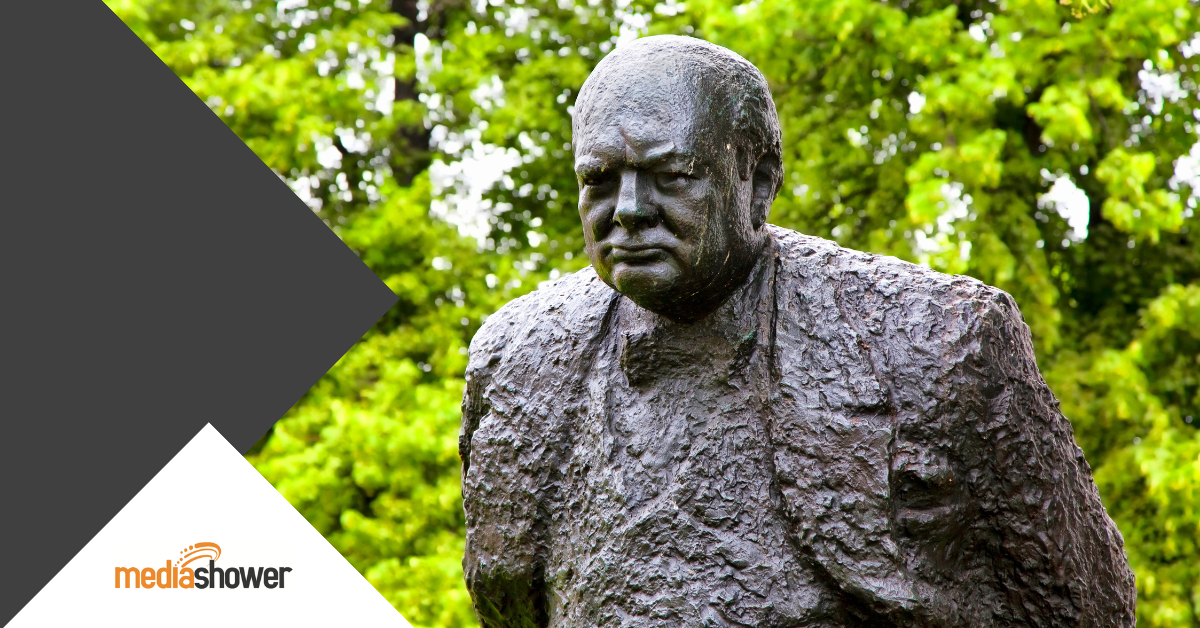
TLDR: British Prime Minister Winston Churchill’s “We Shall Never Surrender” speech helped his people understand both how hard World War II would be, and to give them courage to see it through. Churchill crafted the speech for several different audiences, made it plain-spoken enough for everyone to understand, and gave a strong call to action for the people to fully support the military.
So What? Churchill’s speech not only inspired the British people and government. It also helped America understand that its help would be needed to end the war.
Think About Your Audiences
Churchill’s audience for the speech went beyond British Parliament, where it was delivered. Given the massive public interest in the war effort, he knew the speech would also be broadcasted via radio to the British public and abroad. It would also be published in many newspapers around the world.
He needed Parliament to know Dunkirk had not been a success, but a desperate evacuation that was fortunate enough to save many lives. He needed the British public to know they faced more battles, some of which would likely be on their own land, but British forces were resolute in their determination to prevail.
The last part of the speech that refers to the Empire fighting on Britain’s behalf if the nation itself would be occupied was actually meant for America to hear, and it was put in the speech at America’s request. In the eventuality that Britain would be overrun by Germany and its allies, the American government, which had not yet entered the war, promised to get involved and assist the British Navy.
There were elements of his speech intended for each part of Churchill’s audience, including Britain’s enemies. Churchill had a formidable communication task: he had to be realistic for Parliament’s sake, inspirational for the public’s sake, and confident toward both America and the enemy. The speech delivered on all these goals, due to Churchill’s mastery of the spoken word.
Be Simple and Authentic
The recording of Churchill’s famous speech was not made until after the war in 1949, so it’s hard to know how how he sounded at the time the speech was originally given. It was well-known, however, that Churchill tried hard to sound like a regular person in his speeches, which contributed to his great popularity.
He deliberately used plain language to get his points across. This endeared him to everyone from the highest lords to the lowest working men. Everyone paid attention when he spoke because they knew there would be something in it for them to understand and feel.
Churchill often spoke as one of the people in his audience, instead of at them. In the pivotal crescendo of his speech, he repeatedly says “we” in reference to the British military and people. “We shall not flag or fail . . . We shall never surrender . . . We shall fight.” This language of solidarity helped people understand their part in the war. It unified them in a way that speaking at them (“you”) could not have done.
Churchill was said to have worked on his speeches for hours. He read them from a script, but he wrote everything exactly as he wanted to say it, even including dramatic pauses. Despite this preparation, the speeches sounded authentic, maybe because he did not have an operatic voice, but a lisp that he never fully conquered.

Repeat Your CTA
The purpose of Churchill’s “We Shall Never Surrender” speech was to be realistic about the sobering reality of the war, while convincing his audience they could never give up the fight no matter how bad the situation became. He repeated his Call To Action (CTA) several times, to hammer home the point that surrendering to the Nazis was never going to be a possibility:
We shall not flag or fail. We shall go on to the end, we shall fight in France, we shall fight on the seas and oceans, we shall fight with growing confidence and growing strength in the air, we shall defend our island, whatever the cost may be, we shall fight on the beaches, we shall fight on the landing grounds, we shall fight in the fields and in the streets, we shall fight in the hills; we shall never surrender.
His use of repetition hammered home the point that the British forces had the resolve to do what was necessary and that they would always trek forward.
Inspire with Realism
While the actions at Dunkirk saved countless lives, Churchill wanted Parliament to know it couldn’t be called a “victory” because the Germans had been able to weaken the forces of both France and Belgium before British soldiers rescued 338,000 Allied troops from the area.
So before he could inspire the British people, he had to explain the sobering reality, and prepare them for the hardship they’d face. Churchill was so realistic about Dunkirk and the fighting they’d see in the future that it would have been a thoroughly depressing speech without those last two paragraphs of resolve and hope.
To speak inspiring words of courage without acknowledging the difficulty could have been a short-term solution. Instead, Churchill pursued the long-term strategy of showing the real costs of war, but giving the British people courage to see it through.
For marketing content that will inspire your target customer, Media Shower is the end-to-end solution. Click here to try our award-winning content platform for free.
